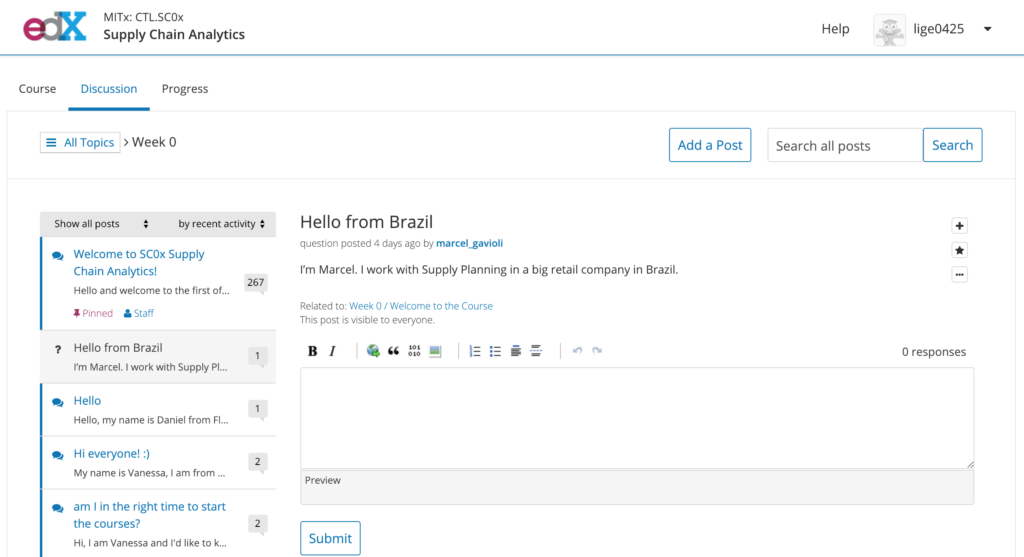EdX: The Path to Learn for Career

When Harvard and MIT team up with Google, would you still be interested in quitting your full-time job to pursue an advanced degree?
In 2012, with a mission to “increase access to high-quality education for everyone, everywhere”, MIT and Harvard University founded edX as a massive open online course (MOOC) platform that provides free online courses from top universities to students from all over the world [1]. What is unique about this platform is that this is the only non-profit MOOC available that is open source to everyone [1]. Prior to the existence of edX, the means to take a Harvard or MIT class were limited to getting admitted by the schools and paying thousands of dollars a year for tuition [2]. Now, 14 million students are taking over 1800 course through edX for free [3].

What are some innovative elements of edX?
- Personalized Videos – To accommodate English as a second language students, there are several adjustable features for the course videos. Students could choose to have transcripts in English, Chinese, or Spanish aside of the video to learn in the language they are more familiar with. They could also adjust the speed of the video from 0.5x to 2.0x according to their needs.

- Verified Certificates and Program Certificates – Students who are not only looking for acquiring skills but also needing certificates would be able to get them from edX by paying a certain fee which varies by courses [4]. Students could also choose from a few types of program certificates – MicroMasters, XSeries, and Professional Certificate, etc. – to get Masters’ equivalent degree certificates or employer friendly certificates over certain type of expertise [5]. These options are more targeted to gaining certain skills or area of expertise for careers and would be a more economy choice for career development compared to getting a full-time degree.
- EdX for Business – edX also offers targeted courses for businesses. They provide courses over the trending themes, such as data analytics or programming languages, and customize for each business requirements [6].
What values does edX bring?
- For Students
- Free access to high-quality courses – edX is the only MOOC platform who provides entirely free courses to the public and many courses are provided by high-profile universities including Harvard and MIT [1].
- Economy for career development – In a survey conducted over 780K people, 87% reported a career benefit of some kind after completing a MOOC, within which 32% had found a new job, received a pay raise, or a promotion [7]. If people could achieve these by paying hundreds of dollars, there is less need to quit a job to get a full-time degree.
- Networks – Through the discussion panel, students can ask questions or introduce themselves, which creates a bridge to the other students who share the same interests.

- For Partnering Universities
- Blended Courses for better educational outcome – Having students learning the contents before in-class discussions enhanced pass rates for courses and helped schools achieve a better educational result [8].
- Recruits more talents through access to the scores – edX did not reduce talent resources from Universities. Instead, partnering schools successfully invited many high-performance students in edX courses for full-time studies.
- For Businesses
- Cheaper training for employees – Compared to sponsoring employees for a part-time MBA, working with edX for business and getting certificates over targeted fields is more economy for businesses.
How does edX sustain itself as a non-profit business?
EdX’s primary source of revenue is the partnering universities. For each course listed through edX, they charge the university a base rate from $50-250K plus 30-50% revenue made beyond this base rate depends on the type of course offering [9].
In the end, although edX is only the second largest player in the MOOC market [10], as a non-profit business, the value it brings to the broader students globally should be recognized and encouraged.
Sources:
[1]”About Us”, edX, 2019. [Online]. Available: https://www.edx.org/about-us. [Accessed: 24- Feb- 2019].
[2]H. Garden, “How edX Works”, HowStuffWorks, 2019. [Online]. Available: https://people.howstuffworks.com/edx.htm. [Accessed: 24- Feb- 2019].
[3]”EdX”, En.wikipedia.org, 2019. [Online]. Available: https://en.wikipedia.org/wiki/EdX. [Accessed: 24- Feb- 2019].
[4]”What types of certificates does edX offer?”, edX Help Center, 2019. [Online]. Available: https://support.edx.org/hc/en-us/articles/206212058-What-types-of-certificates-does-edX-offer-. [Accessed: 24- Feb- 2019].
[5]”How do edX courses work? | Class Central Help Center”, Class-central.com, 2019. [Online]. Available: https://www.class-central.com/help/how-edx-courses-work. [Accessed: 24- Feb- 2019].
[6]”Enterprise Training and eLearning Built for Businesses by edX | edX For Business”, Business.edx.org, 2019. [Online]. Available: https://business.edx.org/. [Accessed: 24- Feb- 2019].
[7]”Who’s Benefiting from MOOCs, and Why”, Harvard Business Review, 2019. [Online]. Available: https://hbr.org/2015/09/whos-benefiting-from-moocs-and-why. [Accessed: 24- Feb- 2019].
[8]H. Garden, “How edX Works”, HowStuffWorks, 2019. [Online]. Available: https://people.howstuffworks.com/edx2.htm. [Accessed: 24- Feb- 2019].
[9]”How edX Plans to Earn, and Share, Revenue From Free Online Courses”, The Chronicle of Higher Education, 2019. [Online]. Available: https://www.chronicle.com/article/How-edX-Plans-to-Earn-and/137433. [Accessed: 24- Feb- 2019].
[10]”By The Numbers: MOOCS in 2017 — Class Central”, Class Central’s MOOC Report, 2019. [Online]. Available: https://www.class-central.com/report/mooc-stats-2017/. [Accessed: 24- Feb- 2019].
[11]J. Goulart, “EdX Partners Top Times Higher Education World University Rankings | edX Blog”, edX Blog, 2019. [Online]. Available: https://blog.edx.org/edx-partners-top-times-higher-education-world-university-rankings. [Accessed: 24- Feb- 2019].



Great post! One component of value creation that you allude to in your final point is the positive externality of education at a societal level. Perhaps that suggests that platforms that benefit society in such a fashion should actually be subsidized by governmental agencies. If that were to happen, these platforms would likely have to work to articulate and quantify the value that they bring to a society.
Thanks for the comment! It is an interesting thought that edX could be subsidized by governmental agencies since they bring value at a societal level. I personally think it would be difficult to be subsidized by any US governmental agencies since this is a global platform. It is hard to imagine a certain State in the US would pull money to subsidize a global platform. However, it might make sense for developing countries to subsidize edX in order to have their population get easier access to education.
How do platforms like EdX and Coursera reform or re-establish the status of certain universities? For instance, does having Ivy League institutions on these platforms magnify or dilute their brand equity? My suspicion is that the ability to export a particular professor or subject expertise is particularly compelling to these, and may generate the same concerns that the NYT and other publishers had when migrating online – will our editorialists leave and create their own brands as bloggers / free lancers? Will the entrepreneurial professor on these platforms utilize in a manner akin to a TED talk?
In my personal opinion, having the high profile institutions on these platforms would magnify their brand equity and is less likely to result in losing their ‘star’ faculties. Having taken a course on edX, I have experienced the quality of content and known the statistics of the passing rate. The pre-made videos are of great quality and they certainly show the educational resources of the participating institutions through the courses. As I mentioned in the blog, I believe this is a good advertisement for the full-time programs at the universities. As to the professors who are teaching through these platforms, I agree it might be a good option to become a freelancer once they acquire a certain fame. However, I have not yet heard of these cases. Many professors would still prefer to pursue their tenure at these well-known universities which has better guarantee of financial incomes and resources for researches. In the long run, continuous researches is a better way to keep competency of these professors. Interesting questions to think about. Thanks for bringing them up!
Great post! I see employee training as a the biggest value creation of this. The corporate training industry is $94 billion and growing, and firms are outsourcing that training more often [1].
[1] https://trainingmag.com/trgmag-article/2017-training-industry-report/
Agreed! Thanks for sharing!
Ge,
Thanks for the post! As a person who has completed courses both on EdX and Coursera, I was shocked when you stated that EdX’s primary source of revenue is from fees to partnering universities, which on a -per-course basis are quite significant! I would be curious to see if the fees act as a deterrent for smaller universities from offering similar courses to those offered by more renowned institutions, or if those universities can get value from their EdX courses as a screening mechanism for full-time students as you stated in your post.
Coursera’s courses used to be significantly more expensive than EdX’s certificates (around $300 per course), which I am sure yields higher course completion rates per participant, but which deterred me from “exploratory” courses (the course that I completed there was an Intro to Finance prior to HBS). I would say that my WTP for these MOOC offerings is higher than what EdX charges (which allows students to audit any courses for free, and where the only expensive offerings are the MicroMasters) but much lower than Coursera’s (which has shifted to a subscription model, with most courses between $40-$80 USD a month). Coursera also has an audit feature, but it provides much more limited functionality than EdX’s.
Reference
https://www.class-central.com/help/how-much-coursera-cost
Ge, nice thanks for writing about edX! it a great tool for long distance learning and I used it myself as a way to get a feeling of how these top universities teach their students, and in that sense it leverages the prestige/reputation these schools have into a good cause. However online educational platforms like edX and MOOCs in general are having a privacy concerns with their big data (especially sensitive data for students, related to the FERPA act) and it would be thought-provoking to see where this would play to the MOOC platforms businesses.
Great post Ge! No doubt platforms like edX are one of the greatest innovation that brings high quality education closer to the masses. Not only it’s affordable, it’s equally immersive and disciplined in its approach. Another way I see edX can create value in future is by going beyond the course. It can form a community of people/students with shared interests where people can continue to expand their knowledge based by sharing and discussing with each other even after the course ends. It can be an advanced form of discussion forum that they currently have on their portal which is only active until the duration of the course. This way doing a course on edX will just become the beginning of the plethora of knowledge one can gain in the field of interest.